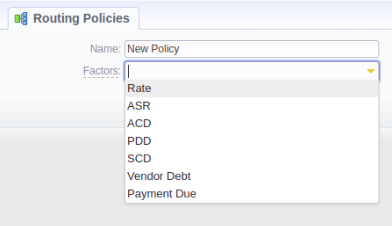Dynamic Routing Policies
Section overview
This section describes the list of currently available routing policies for JeraSoft Billing. Routing policy is a set of regulations and principles (appeal) that determine the way all available terminators are prioritized during dynamic routing. Each policy has its unique principles of terminators prioritizing and allows a user a wide variety of possibilities to configure the system in the best suitable way.
Below you will find a description of 6 standard DR policies:

| Policy | Description |
|---|---|
| Cash Flow | When vendors owe you the most and have long periods to invoice due date, they get higher priority in routing |
| Proportional | When the price is lower and a route quality is higher, it has a higher priority |
| Simple LCR | Generic price-based routing |
| Simple Quality | Generic quality-based routing |
Adding a New DR Policy
To add your custom DR policy, click the Add Routing Policy button. The following window will open showing the available settings:

| Field | Description |
|---|---|
| Name | Set the name of the respective policy |
| Factors | Specify the factors for the system to consider during building the DR table. You can select multiple factors |
Available factors are:
- Rate - vendor's rate for the destination, vendors with a lower rate will get higher position in routing;
- ASR - vendor's ASR, analyzed by Summary Report data for the duration given in the System Confirmation;
- ACD - vendor's ACD, analyzed by Summary Report data for the duration given in the System Confirmation;
- PDD - vendor's PDD, analyzed by Summary Report data for the duration given in the System Confirmation;
- SCD - vendor's SCD, analyzed by Summary Report data for the duration given in the System Confirmation;
- Vendor Debt - considers the amount a vendor owes you; vendors, that owe you the most, are moved to a higher position in routing;
- Payment Due - considers the next payment date to a vendor (date of next invoice + due days); vendors with longer periods till due date get higher positions.
Note that it is possible to create a Routing Policy without any factors. As a result, all Appeal values will be the same for this Policy. During the routing process, all routes with all other similar parameters will be randomly reordered.